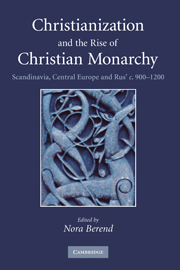Book contents
- Frontmatter
- Contents
- Contributors
- List of maps
- Acknowledgements
- Note
- List of common abbreviations
- Chapter 1 Introduction
- Chapter 2 From paganism to Christianity in medieval Europe
- Chapter 3 The kingdom of Denmark
- Chapter 4 The kingdom of Norway
- Chapter 5 The kingdom of Sweden
- Chapter 6 Bohemia and Moravia
- Chapter 7 The Kingdom of Poland, with an Appendix on Polabia and Pomerania between paganism and Christianity
- Chapter 8 The kingdom of Hungary
- Chapter 9 Rus'
- Index
- References
Chapter 3 - The kingdom of Denmark
Published online by Cambridge University Press: 24 June 2009
- Frontmatter
- Contents
- Contributors
- List of maps
- Acknowledgements
- Note
- List of common abbreviations
- Chapter 1 Introduction
- Chapter 2 From paganism to Christianity in medieval Europe
- Chapter 3 The kingdom of Denmark
- Chapter 4 The kingdom of Norway
- Chapter 5 The kingdom of Sweden
- Chapter 6 Bohemia and Moravia
- Chapter 7 The Kingdom of Poland, with an Appendix on Polabia and Pomerania between paganism and Christianity
- Chapter 8 The kingdom of Hungary
- Chapter 9 Rus'
- Index
- References
Summary
BEFORE CHRISTIANITY: RELIGION AND POWER
If the Danish evidence were considered in isolation, very little would be known of the Danish pagan religion. A few rune-stones carry invocations to the god Thor, and onomastic evidence indicates that Thor was by far the most popular of the gods of the Nordic pantheon. The name of the god Freyr is attested as a component in a few names on rune-stones, but while the names alluding to Thor remained in use after the conversion, the names referring to Freyr did not. Although its philological roots have nothing to do with the pagan god, the name Odinkar seems to have been understood in the eleventh century to be referring to Odin (Wodan). A broader range of the Nordic pantheon is represented in place names; the name of the later episcopal city of Odense is derived from ‘Odin's vi’, that is, the sacred ground of Odin, indicating that it was a location for pagan cult before the conversion.
Any idea of the myths and beliefs connected with these gods can be obtained only from Icelandic literature; Saxo Grammaticus's heavily reworked and classicizing rendering of the myths (c. 1200) is ultimately derived from Icelandic informants. A few pieces of art can be identified as representations of mythical episodes known from the Icelandic literature.
Information
- Type
- Chapter
- Information
- Christianization and the Rise of Christian MonarchyScandinavia, Central Europe and Rus' c.900–1200, pp. 73 - 120Publisher: Cambridge University PressPrint publication year: 2007
References
Accessibility standard: Unknown
- 29
- Cited by
